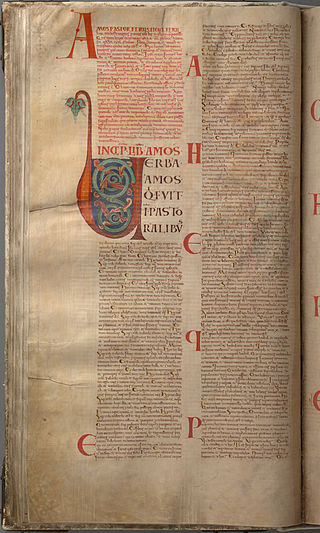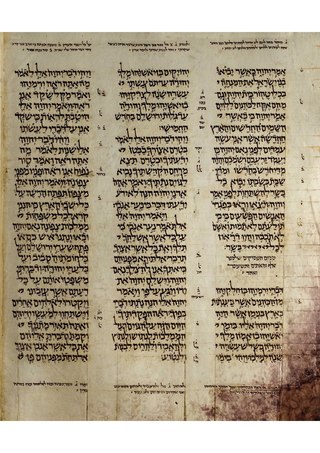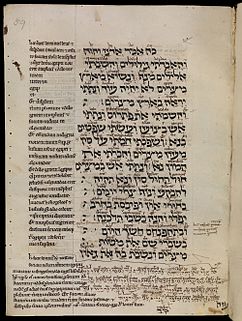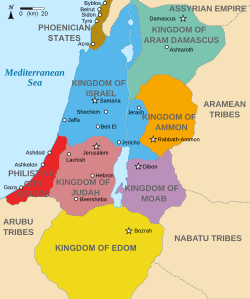
Ezekiel 48 is the forty-eighth chapter of the Book of Ezekiel in the Hebrew Bible or the Old Testament of the Christian Bible. This book contains the prophecies attributed to the prophet/priest Ezekiel, and is one of the Books of the Prophets. Chapters 40-48 give the ideal picture of a new temple. The Jerusalem Bible refers to this section as "the Torah of Ezekiel".
Isaiah 11 is the eleventh chapter of the Book of Isaiah in the Hebrew Bible or the Old Testament of the Christian Bible. This book contains prophesies attributed to the prophet Isaiah. This chapter can be divided into two main parts, verses 1–9 and verses 11–16, with verse 10 as a connecting statement between them. The New International Version entitles the chapter "The Branch from Jesse".

Isaiah 15 is the fifteenth chapter of the Book of Isaiah in the Hebrew Bible or the Old Testament of the Christian Bible. This book contains the prophecies attributed to the prophet Isaiah, and is one of the Books of the Prophets. This chapter and the following chapter deal with the forthcoming history of Moab.

Zechariah 3 is the third of the 14 chapters in the Book of Zechariah in the Hebrew Bible or the Old Testament of the Christian Bible. This book contains the prophecies attributed to the prophet Zechariah, and is a part of the Book of the Twelve Minor Prophets. The chapter contains the vision of Joshua, the high priest, being cleansed before God. It is a part of a section consisting of Zechariah 1–8.

Amos 1 is the first chapter of the Book of Amos in the Hebrew Bible or the Old Testament of the Christian Bible. This book contains the prophecies attributed to the prophet Amos, and is a part of the Book of the Twelve Minor Prophets. This chapter contains prophecies of God's judgments on Israel's neighbours, Syria, Philistia, Tyre, Edom, and Ammon. Judgments on Moab, and on Israel itself, follow in chapter 2.

Amos 2 is the second chapter of the Book of Amos in the Hebrew Bible or the Old Testament of the Christian Bible. In the Hebrew Bible, Amos is a part of the Book of the Twelve Minor Prophets. The book contains prophecies attributed to the prophet Amos. This chapter contains his prophecies regarding God's judgment against Moab, Judah, and Israel, following a pattern established in chapter 1.

Jeremiah 23 is the twenty-third chapter of the Book of Jeremiah in the Hebrew Bible or the Old Testament of the Christian Bible. This book contains prophecies attributed to the prophet Jeremiah, and is one of the Books of the Prophets.

Ezekiel 4 is the fourth chapter of the Book of Ezekiel in the Hebrew Bible or the Old Testament of the Christian Bible. This book is one of the Books of the Prophets and contains the prophecies attributed to the prophet/priest Ezekiel. In this chapter, following God's command, Ezekiel performs a sign-act, a symbolic representation of the siege of Jerusalem and resulting famine.

Ezekiel 2 is the second chapter of the Book of Ezekiel in the Hebrew Bible or the Old Testament of the Christian Bible. This book contains the prophecies attributed to the prophet/priest Ezekiel and is one of the Book of the Prophets. In this chapter, set within a wider section from Ezekiel 1:28b to Ezekiel 3:15, "Ezekiel receives a commission [from God] to go to the 'rebellious house' of Israel" and to speak for God.

Ezekiel 5 is the fifth chapter of the Book of Ezekiel in the Hebrew Bible or the Old Testament of the Christian Bible. This book contains the prophecies attributed to the prophet/priest Ezekiel, and is one of the Prophetic Books. This chapter contains the prophecies using the division of the prophet's shaved hair as a sign, showing God's judgment upon Jerusalem, by pestilence, by famine, by the sword, and by dispersion. The siege is described again in chapter 6.

Jeremiah 47 is the forty-seventh chapter of the Book of Jeremiah in the Hebrew Bible or the Old Testament of the Christian Bible. This book contains prophecies attributed to the prophet Jeremiah, and is one of the Books of the Prophets. This chapter is part of a series of "oracles against foreign nations", consisting of chapters 46 to 51. In particular, chapters 46-49 focus on Judah's neighbors. This chapter contains the poetic oracles against the Philistines.

Ezekiel 28 is the twenty-eighth chapter of the Book of Ezekiel in the Hebrew Bible or the Old Testament of the Christian Bible. This book contains the prophecies attributed to the prophet/priest Ezekiel, and is one of the Books of the Prophets. This chapter contains a prophecy against the king of Tyre and a prophecy against neighbouring Sidon, concluding with a promise that Israel will be "delivered from the nations".

Ezekiel 29 is the twenty-ninth chapter of the Book of Ezekiel in the Hebrew Bible or the Old Testament of the Christian Bible. This book contains the prophecies attributed to the prophet/priest Ezekiel, and is one of the Books of the Prophets. Chapters 29–32 contain seven oracles against Egypt, balancing the seven oracles against Israel's smaller neighbors in chapters 25–28.

Ezekiel 30 is the thirtieth chapter of the Book of Ezekiel in the Hebrew Bible or the Old Testament of the Christian Bible. This book contains the prophecies attributed to the prophet/priest Ezekiel, and is one of the Books of the Prophets. Biblical commentator Susan Galambush observes that Chapters 29–32 contain seven oracles against Egypt, balancing the seven oracles against Israel's smaller neighbors in chapters 25–28. Andrew Davidson divides this chapter into two prophecies, "the first of which, verses 1-19, in all probability belongs to the same date as Ezekiel 29:1–16, that is, about seven months before the fall of Jerusalem; and the second, verses 20-26, is dated four months before the capture of the city".

Ezekiel 35 is the thirty-fifth chapter of the Book of Ezekiel in the Hebrew Bible or the Old Testament of the Christian Bible. This book contains the prophecies attributed to the prophet/priest Ezekiel, and is one of the Books of the Prophets. This chapter contains a prophecy against Mount Seir in Edom, to the south of Judah. Biblical commentator Susan Galambush pairs it with an oracle promising "restoration to the mountains of Israel" in the following chapter.

Ezekiel 36 is the thirty-sixth chapter of the Book of Ezekiel in the Hebrew Bible or the Old Testament of the Christian Bible. This book contains the prophecies attributed to the prophet/priest Ezekiel, and is one of the Books of the Prophets. This chapter contains two prophecies, one conveying "hope for the mountains of Israel" and one declaring that Israel's restoration is assured. Biblical commentator Susan Galambush pairs the first of these with an oracle condemning Mount Seir in Edom in the previous chapter.

Jeremiah 9 is the ninth chapter of the Book of Jeremiah in the Hebrew Bible or the Old Testament of the Christian Bible. This book contains prophecies attributed to the prophet Jeremiah, and is one of the Books of the Prophets.

Jeremiah 49 is the forty-ninth chapter of the Book of Jeremiah in the Hebrew Bible or the Old Testament of the Christian Bible. This book contains prophecies attributed to the prophet Jeremiah, and is one of the Books of the Prophets. This chapter is part of a series of "oracles against foreign nations", consisting of chapters 46 to 51. In particular, chapters 46-49 focus on Judah's neighbors.

Jeremiah 27 is the twenty-seventh chapter of the Book of Jeremiah in the Hebrew Bible or the Old Testament of the Christian Bible. The material found in Jeremiah 27 is found in Jeremiah 34 in the Septuagint, which orders some material differently. This book contains prophecies attributed to the prophet Jeremiah, and is one of the Books of the Prophets. The New American Bible (NABRE) describes chapters 27-29 as "a special collection of Jeremiah’s prophecies dealing with false prophets", and suggests that "stylistic peculiarities evident in the Hebrew suggest that these three chapters once existed as an independent work".

Jeremiah 48 is the forty-eighth chapter of the Book of Jeremiah in the Hebrew Bible or the Old Testament of the Christian Bible. This book contains prophecies attributed to the prophet Jeremiah, and is one of the Books of the Prophets. This chapter is part of a series of "oracles against foreign nations", consisting of chapters 46 to 51. In particular, chapters 46-49 focus on Judah's neighbors. This chapter contains the poetic oracles against Moab.









